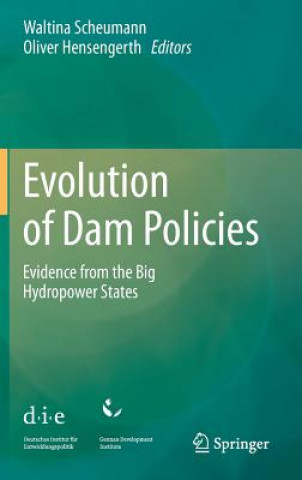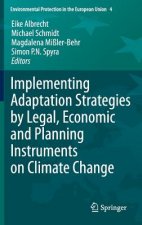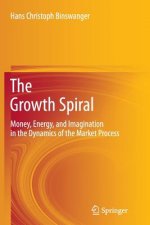
Code: 01658672
Evolution of Dam Policies
by Waltina Scheumann, Oliver Hensengerth
The World Commission on Dams (WCD) report (2000) Dams and Development: A New Framework for Decision-Making has set a landmark in the highly contested controversy over large dams which has yet not ended. Now that more than ten year ... more
- Language:
 English
English - Binding: Hardback
- Number of pages: 352
Publisher: Springer-Verlag Berlin and Heidelberg GmbH & Co. KG, 2014
- More about this

176.49 €

Low in stock at our supplier
Shipping in 12 - 15 days
Potřebujete více kusů?Máte-li zájem o více kusů, prověřte, prosím, nejprve dostupnost titulu na naši zákaznické podpoře.
Add to wishlist
You might also like
-

Mary Poppins
8.29 € -26 % -

Code
35.01 € -

The Book of Seances
20.80 € -25 % -

Funny You Should Ask
14.10 € -19 % -

World War II The Definitive Visual Guide
25.60 € -18 % -

Basics of Human Andrology
95.05 € -4 % -

Cambridge Grammar of Classical Greek
46.42 € -

One Piece, Vol. 91
10.10 € -21 % -

Native American Style Seed Bead Jewelry. Part I. Bracelets
16 € -7 % -

Hell in Japanese Art
53.52 € -27 % -

Bloodborne Official Artworks
34.21 € -24 % -

Generic Programming and the STL
69.13 € -

Longman Dictionary of Contemporary English 6 paper
47.52 € -

Land, Custom and Practice in the South Pacific
124.36 € -

Python For Kids
37.51 € -18 % -

Pokemon Adventures (Red and Blue), Vol. 1
10 € -15 % -

Improving Oral Health for the Elderly
186.70 € -

Fatty Acids
258.64 € -

Plyš očka Monstaz neon green přívěšek
2.89 € -26 % -

Uno, dos tres...Ya!
17.40 € -6 % -

Irish Christmas (Premium Edition)
17.90 € -

Gebrauchsanweisung für Salzburg und das Salzburger Land
15.70 € -5 % -

Methoden und Angebote fur Wissensmanagement in Archiven
35.51 € -7 % -

Rowerem i pieszo przez Czarny Ląd
9.40 € -10 % -

Identitat & Stadtmarketing - Eine netzwerktheoretische Formulierung stadtischer Identitat und identitatsorientierten Stadtmarketings
51.72 € -7 % -

Praxishandbuch Datenschutz im Arbeitsverhaltnis
49.62 € -4 % -

Noční hlídka
9.40 € -20 % -

Superfarmer de lux
23.30 €
Give this book as a present today
- Order book and choose Gift Order.
- We will send you book gift voucher at once. You can give it out to anyone.
- Book will be send to donee, nothing more to care about.
More about Evolution of Dam Policies
You get 446 loyalty points
 Book synopsis
Book synopsis
The World Commission on Dams (WCD) report (2000) Dams and Development: A New Framework for Decision-Making has set a landmark in the highly contested controversy over large dams which has yet not ended. Now that more than ten years passed, one has to realize that the WCD norms matter but that their real chance of getting implemented relies on whether their core values, strategic priorities and guidelines are accepted by national decision-makers and are translated into official policies and practices. With the liberalization and deregulation of the energy sector, new actors such as private investors come into play, and new regulatory bodies were created. Furthermore, international financial institutions had reduced their commitment to dam building during the 1990s but are slowly re-engaging in the dam business in order to facilitate a low carbon development path (hydropower being one component in the renewable energy mix). Stricter international norms and the change of actors that resulted in changes of decision-making structures has forced the international environment movement to adjust its political strategies. Therefore we were particularly interested in understanding the role civil society and transnational NGO-networks play in influencing decisions on international and national levels. Meanwhile, Chinese actors, such as China ExIm Bank and Sinohydro, managed to become the largest financiers of dam projects in Africa and are catching up in Asia, and it is argued by many, that they distort competition. In order not to simply endorse widespread prejudices, Chinese engagement is judged on evidence obtained in the field (Ghana and Cambodia). The chapters cover the broad range of issues mentioned. In detail, the two introductory chapters consider changes in the global dam debate and government reaction to this, exemplified by development policies of the German government. Section I considers norm formation processes in Brazil, China, India and Turkey, including the application of norms in selected dam projects. Section II examines the relevance of new actors in driving norms for hydroelectric dams. The focus here is on two sets of actors: private companies in liberalised energy markets and transnational advocacy networks. Section III analyses the role of Chinese actors (government, banks and firms) in norm diffusion in Chinese foreign direct investment in hydroelectric dams. The issues are then explored in detail, exemplified by Chinese investment in Ghanaian and Cambodian hydropower projects.
 Book details
Book details
Book category Books in English Law Laws of Specific jurisdictions Environment, transport & planning law
176.49 €
- Full title: Evolution of Dam Policies
- Subtitle: Evidence from the Big Hydropower States
- Author: Waltina Scheumann, Oliver Hensengerth
- Language:
 English
English - Binding: Hardback
- Number of pages: 352
- EAN: 9783642234026
- ISBN: 364223402X
- ID: 01658672
- Publisher: Springer-Verlag Berlin and Heidelberg GmbH & Co. KG
- Weight: 696 g
- Dimensions: 161 × 241 × 25 mm
- Date of publishing: 11. March 2014
Trending among others
-

Climate Casino
21.90 € -

Eradicating Ecocide
30.11 € -

Scientific Foundations of Zoos and Aquariums
46.82 € -15 % -

Wild Life
25.20 € -11 % -

Practical Guide to Drone Law
44.12 € -2 % -

Wildlife Crime: From Theory to Practice
36.81 € -4 % -

Ecosystem Services - Concept, Methods and Case Studies
168.49 € -4 % -

Community Planning Handbook
53.42 € -

Governing International Watercourses
74.83 € -

Earth is Our Business
24.20 € -4 % -

Effect of No-fault Automobile Insurance on Driver Behavior and Automobile Accidents in the United States
19.80 € -

Law and Autonomous Vehicles
252.94 € -

Food sovereignty, food security and the contribution of agricultural law
157.48 € -

EU Waste Law
285.46 € -

Preussen
41.91 € -3 % -

ADR / RID 2023 mit nationalen Vorschriften
54.02 € -9 % -

EU Environmental Liability Directive
379.71 € -

Wetlands
164.29 € -

ADR 2025, m. 1 Buch, m. 1 Online-Zugang
54.62 € -4 % -

European Environmental Law
56.42 € -

EU Environmental Law, Governance and Decision-Making
56.62 € -

Implementing Adaptation Strategies by Legal, Economic and Planning Instruments on Climate Change
114.76 € -

Litigating Animal Law Disputes
111.76 € -18 % -

Making of Environmental Law
41.71 € -

Environmental Law in Scotland
130.47 € -9 % -

Guide to the National Planning Policy Framework
131.17 € -

European Environmental Law
105.45 € -

Environmental Law and Economics
214.92 € -2 % -

Pollution and Property
51.42 € -

Transportation Operations Management
130.17 € -

Guide to EU Environmental Law
110.46 € -

Philosophical Foundations of Environmental Law
56.62 € -

Game of Conservation
39.41 € -

Environmental Law and Climate Change
894.12 € -9 % -

Ecosystem Services - Concept, Methods and Case Studies
121.36 € -4 % -

Loss and Damage from Climate Change
54.22 € -2 % -

Compliance and Enforcement in Environmental Law - Toward More Effective Implementation
212.92 € -10 % -

Ending Dirty Energy Policy
126.36 € -

Beyond Kyoto - A New Global Climate Certificate System
176.49 € -

Rethinking Sustainability to Meet the Climate Change Challenge
62.23 € -

Growth Spiral
58.22 € -

EC Agricultural Law
109.05 € -

Pesticide Use in the U.S.
163.79 € -17 % -

2014 Farm Bill
221.72 € -17 % -

Packaging Law Europe
133.37 € -

Environmental Liability and Insurance Recovery
146.58 € -18 % -

How to Deal with Climate Change?
107.75 € -2 % -

Regulating Chemical Risks
176.49 € -

Fraud and Carbon Markets
200.61 €
Collection points Bratislava a 2642 dalších
Copyright ©2008-24 najlacnejsie-knihy.sk All rights reservedPrivacyCookies


 15549 collection points
15549 collection points Delivery 2.99 €
Delivery 2.99 € 02/210 210 99 (8-15.30h)
02/210 210 99 (8-15.30h)